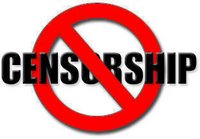Media Censorship in China - FAQ
0 Controversial to the generally accepted perspective that China's Internet censorship efforts are primarily a technological solution only, I feel it's self-regulation as a state of mind that's having the greatest impact on the success of their efforts -- the very same way you're being told not to misbehave while seeing yourself on a monitor when entering a store for instance. Self-censorship as a state of mind by itself is a way of hiding the plain truth that the Chinese government is aware it cannot fully control what information is coming in, and going out of the country. That of course doesn't stop it from speculating it still can. Here's a recent FAQ on the Media Censorship in China answering the following questions :
Controversial to the generally accepted perspective that China's Internet censorship efforts are primarily a technological solution only, I feel it's self-regulation as a state of mind that's having the greatest impact on the success of their efforts -- the very same way you're being told not to misbehave while seeing yourself on a monitor when entering a store for instance. Self-censorship as a state of mind by itself is a way of hiding the plain truth that the Chinese government is aware it cannot fully control what information is coming in, and going out of the country. That of course doesn't stop it from speculating it still can. Here's a recent FAQ on the Media Censorship in China answering the following questions :What is the current media policy in China?
How free is Chinese media?
What are the primary censoring agencies in China?
How does China exert media controls?
How does China control the influence of foreign media?
How do journalists get around media control measures?
The main agencies responsible for history engineering :
"But the most powerful monitoring body is the Communist Party’s Central Propaganda Department (CPD), which coordinates with GAPP and SARFT to make sure content promotes and remains consistent with party doctrine. Xinhua, the huge state news agency (7,000 employees, according to official statistics), is beholden to the CPD and therefore considered by press freedom organizations to be a propaganda tool. The CPD gives media outlets directives restricting coverage of politically sensitive topics—such as protests, environmental disasters, Tibet, and Taiwan—which could be considered dangerous to state security and party control."
Centralization as the core of control, why am I not surprised? Don't tolerate censorship, learn how to undermine it.

0 Comments: